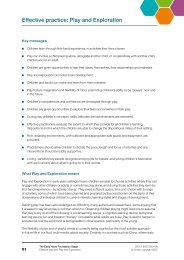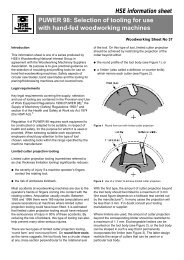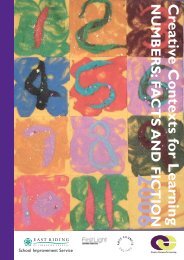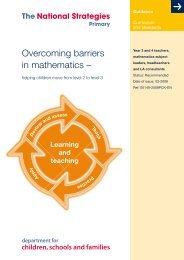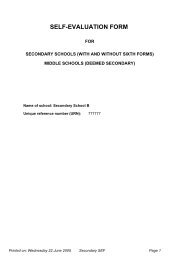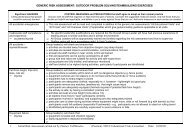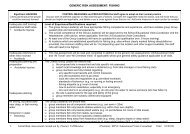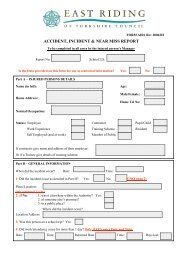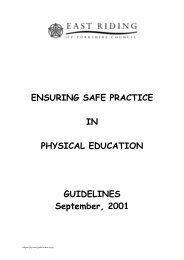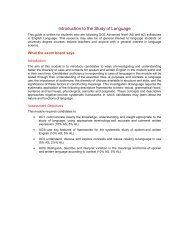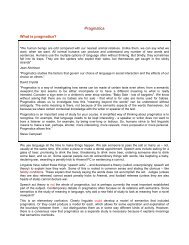Requirements for risk assessments - eRiding
Requirements for risk assessments - eRiding
Requirements for risk assessments - eRiding
Create successful ePaper yourself
Turn your PDF publications into a flip-book with our unique Google optimized e-Paper software.
<strong>Requirements</strong> <strong>for</strong> <strong>risk</strong> <strong>assessments</strong><br />
A childcare factsheet<br />
Introduction<br />
The Statutory framework <strong>for</strong> the Early Years Foundation Stage sets out legal<br />
requirements that all providers must meet. This includes requirements relating to <strong>risk</strong><br />
<strong>assessments</strong>. It requires all those providing <strong>for</strong> the early years age group 1 to carry<br />
out <strong>risk</strong> <strong>assessments</strong> in two circumstances. These are in relation to:<br />
• each type of outing (page 24 of the Statutory Framework)<br />
• outdoor and indoor spaces, furniture, equipment and toys (page 33 of the<br />
Statutory Framework).<br />
This factsheet sets out our expectations relating to the identification, checking and<br />
recording of <strong>risk</strong>s in these two areas.<br />
Risk <strong>assessments</strong> <strong>for</strong> outings<br />
There is a specific legal requirement <strong>for</strong> you to carry out a full <strong>risk</strong> assessment <strong>for</strong><br />
each type of outing and review the assessment be<strong>for</strong>e embarking on each specific<br />
outing. The Statutory Framework makes it clear that this should include an<br />
assessment of the ratios of adults to children needed <strong>for</strong> each type of outing, taking<br />
into account the nature of the outing.<br />
We interpret an outing as being any occasion you leave the premises where you<br />
provide childcare with at least one child being cared <strong>for</strong>. The children do not<br />
necessarily have to return to the premises (<strong>for</strong> example their parents may collect<br />
them from the outing destination; or you could be taking them to school or another<br />
childcare provider). If you are collecting children from elsewhere and bringing them<br />
into the childcare setting, this is not an outing. Technically the need <strong>for</strong> a <strong>risk</strong><br />
assessment does not apply to these occasions although it is good practice to assess<br />
and minimise any <strong>risk</strong>s associated with such a journey.<br />
We do not interpret each type of outing as every single outing you undertake, but <strong>for</strong><br />
each sort of outing you do, <strong>for</strong> example trips to the park, trips to the shops, visits to<br />
the swimming pool and so on. Each of these outings will carry its own particular<br />
<strong>risk</strong>s. For regular outing such as a trip to the park you would need to carry out a full<br />
1 The early years age group is children from birth to 31 August after their fifth birthday.
isk assessment be<strong>for</strong>e the first time you did this, but thereafter you need only<br />
consider the <strong>risk</strong>s <strong>for</strong> the outing and your measures to counteract them, such as your<br />
arrangements <strong>for</strong> first aid and how to contact the children’s parents. A one-off<br />
outing, such as a trip to the beach <strong>for</strong> the day, will need a separate full <strong>risk</strong><br />
assessment.<br />
Unlike the <strong>risk</strong> assessment <strong>for</strong> premises and equipment, the legal requirement makes<br />
no mention of the need to review it regularly or make a written record. However as<br />
the Practice guidance <strong>for</strong> the Early Years Foundation Stage includes outings and trips<br />
and making up a good <strong>risk</strong> assessment, it is good practice <strong>for</strong> all providers to record<br />
<strong>risk</strong> <strong>assessments</strong> connected with outings and trips and to review these at regular<br />
intervals including when you might change something connected with that outing.<br />
For example different aged children are likely to change the <strong>risk</strong>s associated with the<br />
outing, or making the outing at different times of day.<br />
So, in summary, you must <strong>risk</strong> assess each type of outing but you do not have to<br />
carry out a full <strong>risk</strong> assessment be<strong>for</strong>e every outing, providing there is one in place<br />
<strong>for</strong> that type of outing.<br />
Risk <strong>assessments</strong> relating to premises and equipment<br />
The specific legal requirements are to ensure a safe and secure environment that is<br />
checked regularly in order to minimise or remove hazards. There is guidance on the<br />
sorts of things such an assessment might cover on pages 20–21 of the Practice<br />
guidance <strong>for</strong> the Early Years Foundation Stage<br />
The <strong>risk</strong> assessment itself does not necessarily need to be in writing, although it is<br />
good practice to do so. Providers must keep a record of the aspects that need<br />
checking (that is, the things the <strong>risk</strong> assessment identifies as potential hazards or<br />
<strong>risk</strong>s) and when and by whom they have been checked. Our interpretation is that<br />
this record must be in writing. Although the Statutory Framework does not explicitly<br />
state it should be a written record we do not believe it is possible to meet this<br />
requirement without the record being written down. This applies to childminders as<br />
well as childcare providers. One example is the outdoor space, which you may wish<br />
to check be<strong>for</strong>e going outside each day especially if it is possible that other people<br />
may throw rubbish or items like broken glass.<br />
The requirement <strong>for</strong> a record of <strong>risk</strong> assessment to be in writing is no different than<br />
any other requirement <strong>for</strong> records, such as a daily record of children’s names and<br />
attendance, or a record of accidents and any first aid treatment given.<br />
In summary you need to carry out a <strong>risk</strong> assessment of your premises and<br />
equipment at least once a year and more often if things change. You need to keep a<br />
written record of what you have identified that you need to check; how often it<br />
needs checking; and when and by whom it was checked.<br />
2<br />
<strong>Requirements</strong> <strong>for</strong> <strong>risk</strong> <strong>assessments</strong>
Inspecting the record<br />
We will usually ask to see your record of <strong>risk</strong> assessment at inspection and we will<br />
always ask to see this where we identify <strong>risk</strong>s associated with your premises. We will<br />
talk to you (and other staff members where appropriate) about your <strong>risk</strong><br />
<strong>assessments</strong> <strong>for</strong> outings and how you assess <strong>risk</strong>s and adult: child ratios if you do<br />
not have these in writing.<br />
Where you do not have a written record of your <strong>risk</strong> assessment of premises and<br />
equipment we will assess the impact of that failure on children’s well-being,<br />
particularly on their safety, and take this into account when making inspection<br />
judgements.<br />
In all cases, where you fail to have a record of a <strong>risk</strong> assessment <strong>for</strong> premises and<br />
equipment or the record does not include all of the in<strong>for</strong>mation in the specific<br />
requirement, we will raise an action setting out what you need to do and by when to<br />
meet the legal requirements. We may, in some cases, take other en<strong>for</strong>cement<br />
measures. These are set out in the Framework <strong>for</strong> the regulation of those on the<br />
Early Years and Childcare Registers. 2 You cannot be judged as outstanding if you fail<br />
to meet the legal requirement and are most likely to be judged as inadequate unless<br />
you can demonstrate that you understand and manage <strong>risk</strong>s well as you will fail to<br />
meet the specific legal requirement.<br />
If you do have a record of <strong>risk</strong> assessment but it does not include an assessment of<br />
<strong>risk</strong>s <strong>for</strong> outings, we will enquire how and when <strong>risk</strong> <strong>assessments</strong> <strong>for</strong> outings are<br />
carried out. We are likely to raise a recommendation if your record does not include<br />
<strong>risk</strong>s associated with outings as although it is not a legal requirement it is good<br />
practice to do so.<br />
More in<strong>for</strong>mation from Ofsted<br />
The following documents are referred to in this factsheet and can be found by<br />
clicking on the titles below:<br />
Statutory Framework <strong>for</strong> the Early Years Foundation Stage<br />
Conducting Early Years Inspections<br />
Practice Guidance <strong>for</strong> the Early Years Foundation Stage<br />
Framework <strong>for</strong> the regulation of those on the Early Years and Childcare Registers<br />
2 The framework <strong>for</strong> the regulation of those on the Early Years and Childcare Registers is available at<br />
http://www.ofsted.gov.uk/Ofsted-home/Forms-and-guidance/Browse-allby/Other/General/Framework-<strong>for</strong>-the-regulation-of-those-on-the-Early-Years-and-Childcare-Registers<br />
<strong>Requirements</strong> <strong>for</strong> <strong>risk</strong> <strong>assessments</strong><br />
3
There is more useful in<strong>for</strong>mation about <strong>risk</strong> assessment available on our website;<br />
www.ofsted.gov.uk/Ofsted-home/Leading-to-excellence/Twenty-questions-<strong>for</strong>-earlyyears-and-childcare-providers/(language)/eng-GB.<br />
4<br />
<strong>Requirements</strong> <strong>for</strong> <strong>risk</strong> <strong>assessments</strong>
The Office <strong>for</strong> Standards in Education, Children's Services and Skills (Ofsted) regulates and inspects to<br />
achieve excellence in the care of children and young people, and in education and skills <strong>for</strong> learners of<br />
all ages. It regulates and inspects childcare and children's social care, and inspects the Children and<br />
Family Court Advisory Support Service (Cafcass), schools, colleges, initial teacher training, work-based<br />
learning and skills training, adult and community learning, and education and training in prisons and<br />
other secure establishments. It assesses council children’s services, and inspects services <strong>for</strong> looked<br />
after children, safeguarding and child protection.<br />
If you would like a copy of this document in a different <strong>for</strong>mat, such as large print or Braille, please<br />
telephone 0300 123 1231, or email enquiries@ofsted.gov.uk.<br />
You may copy all or parts of this document <strong>for</strong> non-commercial educational purposes, as long as you<br />
give details of the source and date of publication and do not alter the in<strong>for</strong>mation in any way.<br />
To receive regular email alerts about new publications, including survey reports and school inspection<br />
reports, please visit our website and go to ‘Subscribe’.<br />
Royal Exchange Buildings<br />
St Ann’s Square<br />
Manchester<br />
M2 7LA<br />
T: 0300 123 1231<br />
Textphone: 0161 618 8524<br />
E: enquiries@ofsted.gov.uk<br />
W: www.ofsted.gov.uk<br />
No. 100155<br />
© Crown copyright 2010



